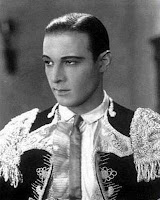Highlander, Dorian Gray, Interview with a Vampire… There are plenty
of movies that feature themes of eternal youth or everlasting life but
unfortunately they’re fantasy. People are born, they live and then they die.
Although we can extend the middle part of that previous sentence through
medicine, we can’t remove the final part altogether. While many of us will live
to reach a ripe old age, grumpily hating
the world that has left us behind, sadly some people die in their prime. In
this week’s Six of the Best I’m looking at six of the best actors who died too
young. Although these actors died in their heyday or at the peak of their
careers, their death has in many cases bought them an almost everlasting, close
to immortal status which their names may have lacked had they lived to grow old,
thus granting eternal youth. So here are Six of the Best… Actors Who Died Too
Young. Let me know who you would have included.
1. Rudolph Vantentino. (Died in
1926 – aged 31)
The world has largely forgotten
cinema’s first male sex symbol. The Italian born actor appeared in close to
forty films between 1914 and 1926 including The
Sheik and The Four Horsemen of the
Apocalypse in 1921. His death at the age of thirty-one caused mass hysteria
among his female fans to whom he was affectionately known as the ‘Latin Lover’.
Valentino’s life has been the subject of several films but his popularity has
been overshadowed by those whose careers continued on into the late 20s and
early sound era.







